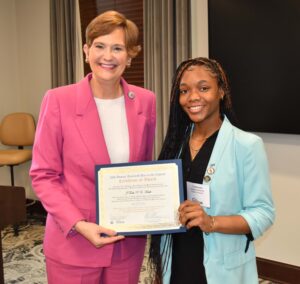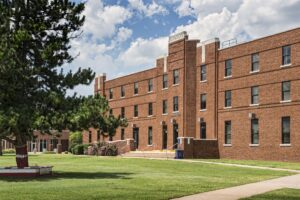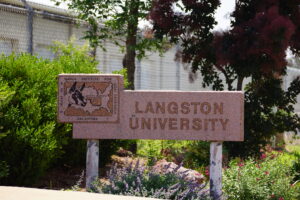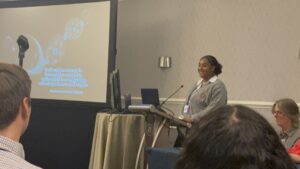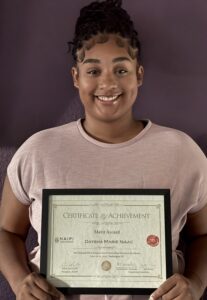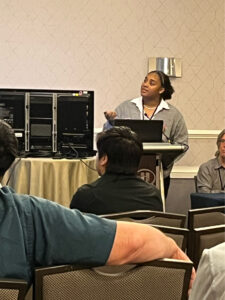
Setting the Bar: J’Taelii Heath strives to carve her own path in research and life
(This story was originally published in ‘E Roar | Vol. 2 Issue 4 on June 13, 2025)
By Ellie Melero, Media Relations Specialist; Jet Turner, Assistant Director of Communications
After almost two weeks of rain, the sun shone bright above W.E. Anderson Stadium as the Langston University Class of 2025 processed onto the football field for the 125th Commencement Ceremony, adding to the air of joy and levity that could be felt all over campus.
Cheering, dancing, noisemakers and more could be heard from all over campus as the hundreds of friends and families packed the stand to celebrate their graduates, nearly 70% of whom are the first in their families to earn a college degree. J’Taelii Heath was one of these first-generation students.
But if it weren’t for the encouragement of her family, and the Langston University McCabe Honors Program, she might not have been able to attend university at all.
Heath grew up in Oklahoma City in a family of entrepreneurs. From working with kids to styling hair, her family was involved in a variety of industries, but the business path never interested Heath. She was more interested in STEM, and the idea of entering the medical field had always intrigued her. When she took a health class in high school with a vegan teacher who taught them about different types of healthy lifestyles, she decided she wanted to go to school to study osteopathic medicine.
“It was just something that stuck with me,” Heath said. “I just wanted to continue to do that research and find a different outlet besides (the plant-based diet).”
Once she knew she wanted to study medicine, Heath knew she needed to get her bachelor’s degree first. As the oldest of five kids, it was also important to her to show her siblings that college was a viable option they could also choose.
As she began looking into schools, she knew wherever she enrolled needed to be affordable, have a good biology program and be close enough to home that she could still be a part of her younger siblings’ lives.
Langston University fit the bill.
Heath earned a McCabe Scholarship, which paid for her tuition, room and board, and entered the Lion Pride as a biology major.
“It just offered the opportunity for me to stay close to family and be able to afford it, of course, with a full ride scholarship,” Heath said. “That was the first step, being in the honors program, having my school paid for, especially coming from a low-income household where I’m the oldest and a first-generation college student.”
When she got to campus, Heath sought out Dr. Byron Quinn. A biology professor and accomplished researcher, Dr. Quinn is a mentor to many LU students, and Heath knew she wanted to join his lab. Dr. Quinn was happy to have her.
In Dr. Quinn’s lab, Heath learned how to properly conduct research. She learned how to handle different types of equipment and run simple experiments. She was eager to learn and a quick study, and she impressed Dr. Quinn. He helped her apply for an internship with the Oklahoma Medical Research Foundation (OMRF) as one of the first OMRF-LU Scholars.
During her OMRF internship, Heath helped design and conduct an experiment using black pepper, more specifically a compound called piperin, as a treatment for multiple sclerosis. Her goal was to find a more natural alternative treatment for the disease that didn’t rely solely on drugs. To her delight, the experiment was a success.
Heath continued working with OMRF as an LU Scholar after the internship was over, and she also began to help out more in Dr. Quinn’s lab. Heath found she really enjoyed research, so she decided to apply to OK-LSAMP, a statewide program that provides financial assistance to student researchers so they can present their research at professional conferences and conventions.
Over the course of her time at Langston University, with the assistance of her professors and the OK-LSAMP program, Heath has presented her research 15 times at local and national conferences.
“It has helped me see the world differently,” Heath said. “Traveling from state to state, people do things differently… It also helped me learn public speaking skills. I’ve always been very shy and not prone to want to go talk to people.”
Heath has also had the opportunity to assist with NASA research at Langston University, specifically with a project focused on studying how to keep astronauts’ immune cells active while in space conditions. Currently, the LU research team is preparing samples to be sent to the International Space Station. Heath will be a part of the team that will analyze the samples upon their return to Earth.
OK-LSAMP manager and associate professor of chemistry at Langston University, Dr. Lindsay Davis, immediately recognized Heath’s potential as an excellent student from the moment she met her in 2021.

Since then, Dr. Davis has seen Heath grow into the inquisitive student she is today. A student who always seeks to improve herself. A student who seeks new opportunities wherever she can find them.
“(Heath) is always wondering how to improve,” Dr. Davis said. “I don’t know if she really realizes her power. (Her power) is evident by all of her accolades. It’s evident. I wish she would seek that part of herself more. But that’s part of being a young Black scientist; you just kind of do it, and she’s doing it.”
As Heath stood to be recognized as a winner of the Outstanding Senior Leader Award during the commencement ceremony, she beamed with power. The award is earned by graduating seniors who go above and beyond throughout their college career in their commitment to leadership, academics, campus involvement, community service and exemplary character, all of which embodied her journey at Langston University.
Eventually her name was called to receive her diploma, and she strolled up the ramp and onto the commencement stage, taking a photo with President Ruth Ray Jackson and shaking hands with the members of the dais.
She walked off the opposite side ramp the first member of her family to graduate college.
“I just want to be the outlet for my siblings, to be that extra guidance to a different path for our family and for generations to follow,” Heath said. “There is a different path that is an option for us.”

